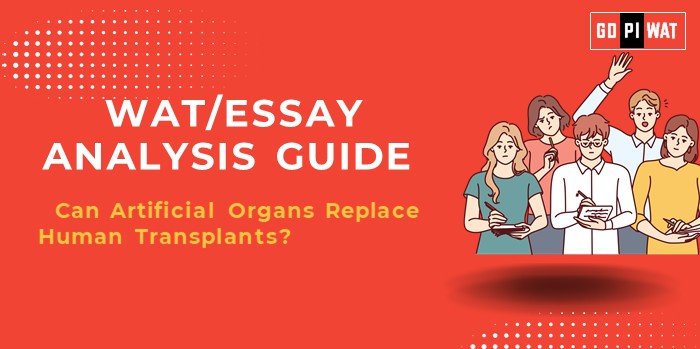📋 Written Ability Test (WAT)/Essay Analysis Guide: Can Artificial Organs Replace Human Transplants?
🌐 Understanding the Topic’s Importance
Artificial organs intersect medicine, technology, and ethics, making this a compelling topic for essays. It aligns with themes of innovation, public health, and economic impact.
⏳ Effective Planning and Writing
- Time Allocation:
- 🕐 Planning: 5 minutes.
- 📝 Writing: 20 minutes.
- 🔍 Review: 5 minutes.
🎯 Introduction Techniques for Essays
- Contrast Introduction: “While traditional organ transplants save millions of lives, the persistent shortage and rejection risks demand alternatives like artificial organs.”
- Solution-Based Introduction: “Advancements in bioengineering suggest a future where artificial organs eliminate the dependency on human donors.”
📑 Structuring the Essay Body
- Achievements: Highlight technological breakthroughs and improved survival rates.
- Challenges with Comparative Analysis: Discuss ethical concerns, costs, and international disparities.
- Future Outlook: Suggest pathways for global adoption and integration with public health systems.
📜 Concluding Effectively
- Balanced Conclusion: “Artificial organs present a beacon of hope in medicine, but their success depends on overcoming ethical, financial, and regulatory hurdles.”
- Future-Focused Conclusion: “With innovations advancing rapidly, artificial organs may soon redefine the concept of transplants, ensuring no life is lost due to organ shortages.”
✍️ Sample Short Essays
- Balanced Perspective: “Artificial organs could resolve organ shortages, but ethical dilemmas and affordability must be addressed for equitable healthcare.”
- Solution-Oriented: “Scaling bioprinting technologies can reduce costs, making artificial organs a viable alternative to human transplants.”
- Global Comparison: “Countries like Sweden lead in artificial organ adoption, offering a model for integrating bioengineering into healthcare systems.”


